- Home
- Piers Anthony
With a Tangled Skein
With a Tangled Skein Read online
THE PROPHECY
The Seer took the left hand of Niobe’s son and the right hand of Pacian and closed her eyes. In a moment they opened again. “Hooh!” she exclaimed, as if letting off a head of steam. “A most remarkable pair! Each will possess the most beautiful woman of her generation, who will bear him a daughter. One daughter will marry death and the other will marry evil.” She cast loose their hands, seeming shaken. “More I dare not say!”
As they moved away from the booth, Pacian asked, “Was that a true telling?”
“So it seems. We know the Seer is authentic,” Atropos said thoughtfully. “One to marry death, the other evil. I’m not sure I like the smell of that.”
Niobe had similar doubts. Death was Thanatos, and Evil was Satan. The daughters would marry Incarnations?
“Trouble!” Atropos said.
Trouble indeed! Niobe agreed.
By Piers Anthony
Published by Ballantine Books:
THE MAGIC OF XANTH
A Spell for Chameleon
The Source of Magic
Castle Roogna
Centaur Aisle
Ogre, Ogre
Night Mare
Dragon on a Pedestal
Crewel Lye: A Caustic Yarn
Golem in the Gears
THE APPRENTICE ADEPT
Book One: Split Infinity
Book Two: Blue Adept
Book Three: Juxtaposition
INCARNATIONS OF IMMORTALITY
Book One: On a Pale Horse
Book Two: Bearing an Hourglass
Book Three: With a Tangled Skein
Book Four: Wielding a Red Sword
A Del Rey Book Published by Ballantine Books
Copyright © 1985 by Piers Anthony Jacob
All rights reserved under International and Pan-American Copyright Conventions. Published in the United States of America by Ballantine Books, a division of Random House, Inc., New York, and simultaneously in Canada by Random House of Canada Limited, Toronto.
Library of Congress Catalog Card Number: 85-6179 ISBN 0-345-31885-4
The song “The Wetlands Waltz,” is used by permission of the author Jill Jarboe of Pine Jog Environmental Sciences Center, 6301 Summit Boulevard, West Palm Beach, Florida 33415.
Manufactured in the United States of America
First Hardcover Edition: October 1985 First Mass Market Edition: October 1986
Cover Art by Michael Whelan
CONTENTS
1. THE BONNIE BOY
2. COLLEGE
3. SHOOTING DEER
4. CLOTHO
5. VOID
6. GENEALOGY
7. CHANGES
8. SECOND LOVE
9. TWIN MOONS
10. LACHESIS
11. TANGLE
12. BLOOD
13. COUNTERPLOY
14. BRIBE
15. MAZE SQUARED
16. ANSWERS
AUTHOR’S NOTE
ABOUT THE AUTHOR
—1—
THE BONNIE BOY
Niobe was the most beautiful young woman of her generation, with hair like buckwheat honey and eyes like the sky on a misty summer morning and a figure that was better imagined than described. But she had her trifling faults, such as an imperious nature fostered by the ability to use her beauty to get her own way, and she was of only average intellect. Also, though she did not know it, she had been marked for a more difficult destiny than she had any right to dream of.
“But, Father!” Niobe protested prettily. “Cedric Kaftan is but sixteen years old, while I am twenty-one! I couldn’t possibly marry him!”
Old Sean raised a pacifying hand. “Some rivers are harder to cross than others, and some boats smaller. These are not easy times, my daughter, for Ireland or the world. He belongs to an excellent family, farmers and scholars, and they take care of their own. His age is immaterial.”
“Immaterial!” she snorted. “He is but a child! Father, you do me wrong to marry me to one who is so young!”
The man’s jaw tightened. He had the power of the patriarch, but he preferred to have harmony. “Daughter, I did not do you wrong. It is true he is young, but he’s growing. He will be a match for you when I am dead and gone.”
“Let him be a match for some little snippet his own age! I absolutely refuse to put up with this indignity!” Her eyes seemed to brighten with her anger, becoming as intense as the midday welkin.
Sean shook his head ruefully, not immune to the luster of his child. “Niobe, you are the bonniest lass in the county, and nicely talented on the loom, but perhaps the most headstrong, too! Twice you have balked at excellent matches, and I was weak enough to let you. Now you are becoming embarrassingly old for a maiden.”
That shook her, but she fought back. “Oh, pooh! A fat old moneybags and an ugly aristocrat! You call those matches?”
“Wealth is not to be sneered at, and neither is aristocracy. You could have had a very easy life, or a very noble one. Such marriages are not easy to come by.”
“Why can’t I have a handsome, virile man of twenty-five or so?” Niobe demanded. “Why burden me with a child who probably doesn’t know his nose from his—”
Her father’s glance stopped her before she went too far. She could only balk him to a certain extent, however softly he might speak. “Because the war has drawn away such men, so that none remain here who are worthy of you. I will not give you to a peasant! You will not marry beneath your station. Cedric is qualified and financially comfortable, thanks to an inheritance, and—”
“And he’s growing,” Niobe finished with disgust.
“And I’m growing—sick of the very notion! I won’t marry such a child, and that’s all there is to it.”
But that wasn’t all there was to it. This time Sean’s foot was firm. Niobe raged and pleaded and cried, to no avail. She was very good at crying, for her name meant “tears,” but her father was impervious. He was determined that this match be consummated.
And so it was. The banns were duly published, and the wedding was held in early summer, when the groom got out of school. Everything was accomplished according to form, but Niobe hardly noticed; she was too chagrined at being married to such a youth. She wouldn’t even look directly at him. As the ceremony concluded, he at least had the wit not to try to kiss her.
Thus they found themselves alone in a cottage, which was his inheritance. It was in a glade near a swamp— pleasant enough by day for those who liked that sort of thing, but sinister by night. That was perhaps part of the idea: a couple was supposed to be bolted inside during darkness, huddled together for warmth and comfort. There were great romantic possibilities; the locale was conducive.
Niobe had no trouble resisting conduction. She wrapped her lovely self up in a voluminous quilt—a wedding gift—and slept on the bed. Young Cedric lay beside the hearth, where there was dwindling radiation from the embers. As the quiet chill of the night intensified, neither stirred.
So they spent their nuptial night, the woman and the boy, in silent isolation. In the morning Cedric got up, stoked the ashes in the fireplace, and went out to relieve himself and fetch more wood. Niobe woke to the sound of an axe splitting billets of wood. It was a good sound, for the morning air was chill indeed; soon there would be physical warmth.
Or would there? She remembered that a fireplace was an ineffective way to heat a house. A good stove put six times as much heat into the surrounding air for the same amount of wood burned. There was a stove here; she would see to it. She might not be a genius, but she was practical when it suited her purpose. For one thing, she needed warm hands to operate her loom properly.
She wrapped her coat about her nightrobe and went out to use the outhouse.
There was an old catalog beside the wooden seat, half-used, and a bucket of ashes. It was an efficient system, she reflected, for this was the classic place for reflection; one could read each page of the catalog before using it, or simply stare at the pictures. The mind was edified while the body was cleaned. The ashes were to sprinkle over the refuse, cutting down on the smell, and of course there was a ready supply of them at the house. The refuse was periodically toted to the garden for compost. It was an old-fashioned system, but a good one; nothing, really, was wasted. Still, she would have preferred a modern city toilet.
She emerged in due course, shivering in the cold, but she paused to watch Cedric at work. He was not cold at all; the effort of splitting heated him. She had to admit he was good at it; he set each billet of wood on the chopping block and halved it cleanly with a single blow of the axe, so that the pieces toppled to either side. He was a boy— but a big boy, with a fine ripple of muscle as he swung the axe. His blond hair jumped as the axe struck, and a muscle in his cheek tightened momentarily. A bonnie boy, indeed!
He saw her and paused. “You’re cold. Miss Niobe,” he said with a rich backwoods accent that, like Niobe’s form, is better imagined than rendered. “Here, take my jacket till I get the wood in. I’m too hot anyway.”
“Don’t call me miss,” she protested. “I am, after all, your wife.” It grieved her to say it, but it was a truth she could not deny, and honesty required that she not attempt to. A marriage, however ill-conceived, was a marriage.
He paused, half-startled. “Uh, sure, I guess so. But you know, ma’am, it was none o’ my notion to get married like this; I’m not even through school.”
She might have guessed! “It wasn’t my idea either,” she said. “At least not—”
“Not to an ignorant kid!” he finished with a rueful grin, “Come on, now, take the jacket before you freeze your toes off, miss—uh, ma’am.” He approached her, jacket extended.
“Just a moment,” she said, constrained to assert her independence even from this. “You look a lot more comfortable than I am. Give me that axe.”
“Oh, that’s not no woman’s work, ma’am! I’ll do it.”
“That isn’t woman’s work,” she said, annoyed by the double negative.
“That’s what I said!” Then he paused, embarrassed. “Oh—you mean the way I said it. I’m sorry. I’m just a backwoods boy, ma’am, and sorry you had to get stuck with—”
“What’s done is done, Cedric,” she said firmly. She wrested the axe from his grip, knowing he could offer no effective resistance to her because she was an adult. She set up a billet and swung at it—and caught the very edge of it. The blade caromed off and plunged into the ground beside her right foot.
“Uh, ma’am, please—” Cedric said, worried.
“No, I can do it!” she said, hauling the axe up again in a wobbly trajectory.
He jumped to intercept her. “Let me help you, ma’am, no offense.”
“You’re afraid I’ll break the axe!” she accused him.
“No ma’am! I’m afraid you’ll chop off a toe, and I’d sure hate to have anything like that happen to a foot as dainty as that.”
She relaxed. His diplomacy was effective because it was unschooled. “So would I! I did come close, didn’t I? All my incidental studies about trees, and I never split a single blivet of—”
“Billet, ma’am,” he said quickly.
She had to laugh. “Of course! I don’t use the language as well as I supposed!”
“Oh, no, you talk real fine, ma’am,” he said. “Now you take the handle like this, see, and—” He reached around her to put his hands over hers, setting hers properly on the handle. His hands were larger than hers, callused and strong, seeming too big for his body. She wondered whether boys, like puppies, had outsized paws if they were still growing into them. If so, Cedric would in due course be a young giant.
“How is it your hands are so rough, when your family is scholarly?” she asked thoughtlessly.
He snatched his hands away. “Oh, you know, fighting,” he said, embarrassed.
Fighting. Well, boys would be boys. “There shouldn’t be cause for that here,” she informed him gently.
“No, ‘course not,” he muttered, scuffling his feet.
“You were showing me how to chop,” she said, taking pity on him.
He got her grip right and her stance right, then guided her through a swing at the billet. She felt the strength in his arms and body as he moved in contact with her; it was amazing how strong he was for his age. This time the blade came down cleanly, perfectly centered, and cleaved the wood asunder. The halves did not fly apart, as this had not been a fully powered blow, but they offered no further resistance.
Niobe tried the next one alone, following the procedure he had shown her. Her strike was not sufficient to split the billet, but it was remarkably close to the center. It was a victory of sorts. She owed that, perhaps, to her coordination with the loom; she could generally place an object where she wanted to, when not struggling with too much weight.
But now the axe was stuck in the wood. She tried to draw it free, but it wouldn’t budge. “Just turn it over, heave it up, and hit it backside, ma’am,” Cedric advised.
She did so, struggling to haul up the heavy billet, and brought the head of the axe down on the block. The wood split itself on the blade and fell apart. “Oh, it worked!” she exclaimed, pleased.
“Sure thing, ma’am,” Cedric agreed. “You got a knack for it.”
“I have a knack—” But she realized that she did not want to be lecturing him about language; it was not the wifely way. “No I don’t, either! I’m just a duffer. But it is fun!”
She split wood for several minutes, and soon was warm enough to remove her coat. “If I had known how satisfying it is to split wood, I would have done it long ago,” she gasped.
“You sure look good doin’ it,” Cedric said.
“No I don’t!” she protested, pleased.
“Yes you do, ma’am. You’re one pretty woman.”
“And you’re one bonnie boy. But I’m getting tired; let’s go in and get some breakfast.”
“No, I mean it, ma’am. You’re the prettiest woman I’ve ever seen, specially when you move like that.”
She looked down at herself. She was glowing from the exertion, breathing hard, and her nightwear was plastered to her bosom. This was not her notion of feminine beauty, but she was flattered all the same. “And I mean it too, Cedric. You’re a young Adonis. When you get your growth, you’ll be attracting all the girls.” Then she paused, flustered, realizing what she had said. Attract girls? He was already married—to her. She felt the flush climbing her face.
He did not reply. He stopped to gather an armful of wood, then carried it into the cabin. But she could tell by the flush on his neck that he felt just as embarrassed as she did. He was young and socially inexperienced, but he was a good young man, meaning well. It was as awkward for him as it was for her.
“Cedric, I—” But what could she say that would not exacerbate the situation? Better to let it drop.
Inside, she explained about the stove. “Sure, ma’am,” he said agreeably. “We use a stove in winter.” He showed his expertise in getting it going, making sure the ashes were not clogging the air vents, adjusting the damper in the stovepipe, and carefully building a structure of paper, kindling and wood in the firebox. “Got to start a cold stove slow,” he explained. “Don’t want it to crack.” But soon enough it was producing comforting heat, and Niobe was making pancakes on its surface.
“You sure know how to cook, ma’am!” Cedric said as he wolfed down his share. He had a huge appetite, as befitted a growing boy.
“I’m a woman,” Niobe said wryly.
“You sure are!” he agreed enthusiastically.
She changed the subject. “I gather that you did not want to—to get married?”
“Pshaw, ma’am, I’m not ready for nothing like that!” he agr
eed. “I don’t know nothing about women. And I wanted to finish school, and get into the track program, so I could maybe make something of myself, you know. But you know how it is when the family decides.”
“I know,” she agreed. “I suppose it’s no secret that I objected to this—I mean, I didn’t even know you, Cedric, just your name and age and that you came from a good family. It’s nothing personal—”
“It’s a good family, all right,” he agreed. “And so’s yours, which is why—you know.” He shrugged. “I just wasn’t, well, quite ready.”
She found herself liking this honest, unassuming boy. She had an idea. “Look, Cedric—why don’t you go to school anyway? We can afford it, and if you really want to get an education—”
His face brightened. “Say, you mean it, ma’am? You’d let me go?”
“I would encourage it, Cedric.”
“But you’d be alone here, ma’am, and—”
“I’ll be safe enough. There are no dragons in these forests.” She smiled.
He paused, as if slightly stunned. Her smile had been known to have that effect on men. Then he frowned. “There is magic, though,” he said darkly. “Those trees cast spells—”
“Not against those who understand them,” Niobe said. “I have been studying the magic of the wetlands forest. Those trees and plants only want to live and let live. But when you come marching in with an axe—”
He was startled. “Say, I never thought of that! If I was a tree, I wouldn’t like it none neither!” Then he paused. “Say—I know I didn’t say that right. Ma’am, would you—”
“If I were a tree, I would not like it any, either,” Niobe said carefully. “Eliminate the double negative.”
“Were, ma’am?”
“That’s the subjunctive mood, used to show supposition. I’m not a tree and never could be, but I’m trying to put myself in the tree’s place, so I signal this by saying ‘If I were a tree.’ To say ‘If I was a tree’ would be to suggest I might have been a tree in the past, and that would be a misrepresentation.”
“It sure would!” He caught himself. “Certainly would. It certainly makes sense the way you tell it, ma’am.”

 Serial
Serial Question Quest
Question Quest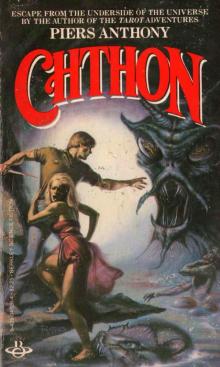 Chthon
Chthon Dragon on a Pedestal
Dragon on a Pedestal E. S. P. Worm
E. S. P. Worm Hope of Earth
Hope of Earth The Series Boxed Set
The Series Boxed Set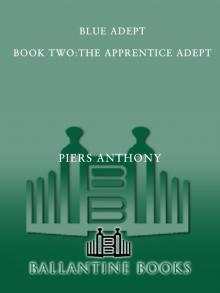 Blue Adept
Blue Adept The Sopaths
The Sopaths Beetle Juice
Beetle Juice Awares
Awares Golem in the Gears
Golem in the Gears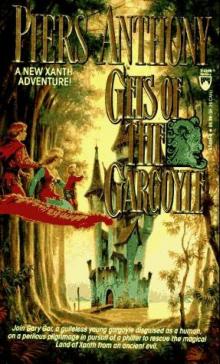 Geis of the Gargoyle
Geis of the Gargoyle Bamboo Bloodbath and Ninja's Revenge
Bamboo Bloodbath and Ninja's Revenge Heaven Cent
Heaven Cent Neq the Sword
Neq the Sword Pandora Park
Pandora Park Juxtaposition
Juxtaposition Bearing an Hourglass
Bearing an Hourglass Dragon Assassin
Dragon Assassin Board Stiff
Board Stiff Virtual Mode
Virtual Mode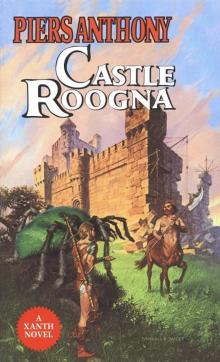 Castle Roogna
Castle Roogna Aliena Too
Aliena Too Pet Peeve
Pet Peeve The Metal Maiden Collection
The Metal Maiden Collection Volk
Volk Phaze Doubt
Phaze Doubt The Color of Her Panties
The Color of Her Panties Amazon Slaughter and Curse of the Ninja Piers Anthony
Amazon Slaughter and Curse of the Ninja Piers Anthony The Worm Returns
The Worm Returns Zombie Lover
Zombie Lover Xone of Contention
Xone of Contention The Gutbucket Quest
The Gutbucket Quest Split Infinity
Split Infinity Dream a Little Dream: A Tale of Myth and Moonshine
Dream a Little Dream: A Tale of Myth and Moonshine Balook
Balook Out of Phaze
Out of Phaze The Secret of Spring
The Secret of Spring Mouvar's Magic
Mouvar's Magic Cube Route
Cube Route Mercenary
Mercenary Total Recall
Total Recall Man From Mundania
Man From Mundania The Magic Fart
The Magic Fart Letters to Jenny
Letters to Jenny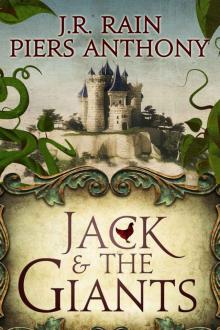 Jack and the Giants
Jack and the Giants Executive
Executive Robot Adept
Robot Adept On A Pale Horse
On A Pale Horse Vale of the Vole
Vale of the Vole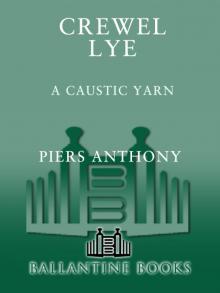 Crewel Lye
Crewel Lye For Love of Evil
For Love of Evil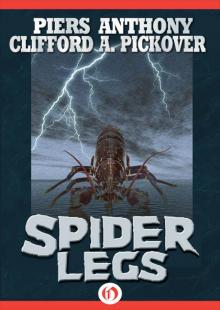 Spider Legs
Spider Legs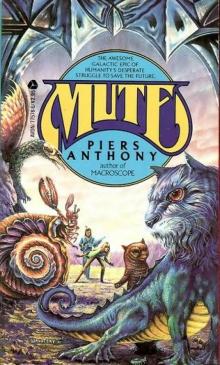 Mute
Mute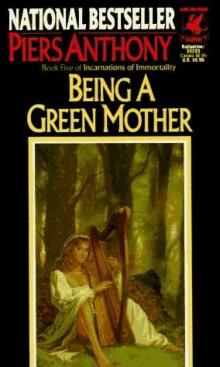 Being a Green Mother
Being a Green Mother Hair Suite
Hair Suite Air Apparent
Air Apparent Politician
Politician Aliena
Aliena Phthor
Phthor Ghost Writer in the Sky
Ghost Writer in the Sky Pornucopia
Pornucopia Eroma
Eroma Shepherd
Shepherd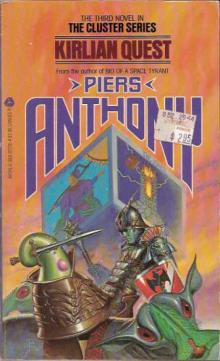 Kirlian Quest
Kirlian Quest Swell Foop
Swell Foop God of Tarot
God of Tarot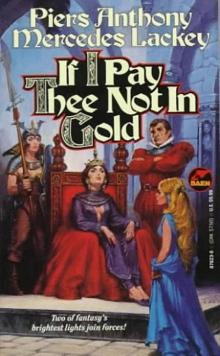 If I Pay Thee Not in Gold
If I Pay Thee Not in Gold Amazon Expedient
Amazon Expedient Faun & Games
Faun & Games Vision of Tarot
Vision of Tarot Centaur Aisle
Centaur Aisle Serpent's Silver
Serpent's Silver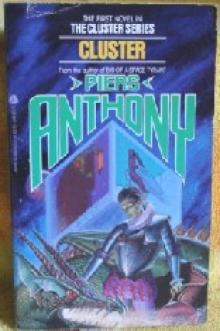 Cluster
Cluster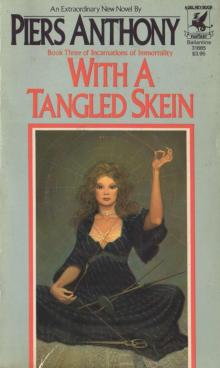 With a Tangled Skein
With a Tangled Skein Chaining the Lady
Chaining the Lady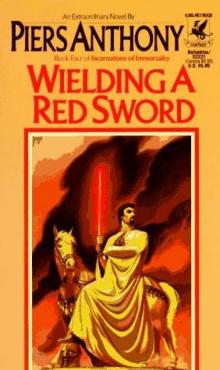 Wielding a Red Sword
Wielding a Red Sword Key to Chroma
Key to Chroma WereWoman
WereWoman Isis Orb
Isis Orb Hair Peace
Hair Peace Two to the Fifth
Two to the Fifth Viscous Circle
Viscous Circle Skeleton Key
Skeleton Key Cautionary Tales
Cautionary Tales The Source of Magic
The Source of Magic Unicorn Point
Unicorn Point Writer's Retweet
Writer's Retweet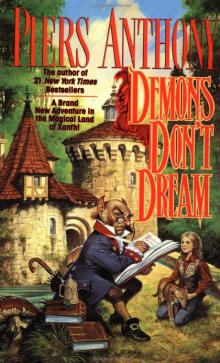 Demons Don't Dream
Demons Don't Dream Ogre, Ogre
Ogre, Ogre The Iron Maiden
The Iron Maiden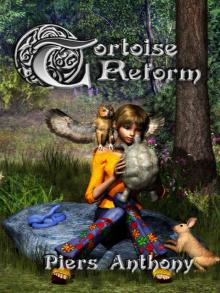 Tortoise Reform
Tortoise Reform Luck of the Draw
Luck of the Draw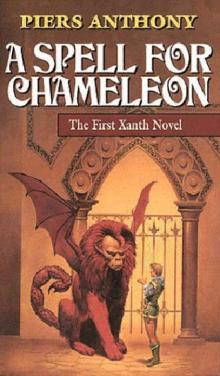 A Spell for Chameleon
A Spell for Chameleon Yon Ill Wind
Yon Ill Wind Currant Events
Currant Events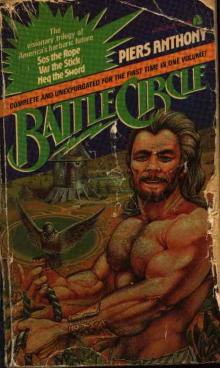 Var the Stick
Var the Stick And Eternity
And Eternity Kiai! & Mistress of Death
Kiai! & Mistress of Death Chimaera's Copper
Chimaera's Copper Refugee
Refugee Isle of View
Isle of View Thousandstar
Thousandstar Mer-Cycle
Mer-Cycle Service Goat
Service Goat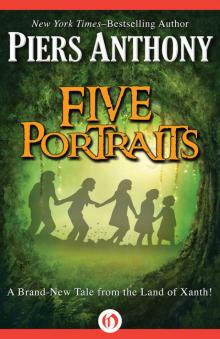 Five Portraits
Five Portraits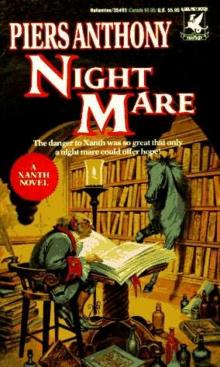 Night Mare
Night Mare Steppe
Steppe Lavabull
Lavabull Well-Tempered Clavicle
Well-Tempered Clavicle Aladdin Relighted
Aladdin Relighted Aladdin and the Flying Dutchman
Aladdin and the Flying Dutchman Knot Gneiss
Knot Gneiss Roc and a Hard Place
Roc and a Hard Place Aladdin Sins Bad
Aladdin Sins Bad Flytrap
Flytrap Prostho Plus
Prostho Plus Esrever Doom
Esrever Doom Hair Power
Hair Power The Journey
The Journey Virtue Inverted
Virtue Inverted Of Man and Manta Omnibus
Of Man and Manta Omnibus Trail Mix: Amoeba
Trail Mix: Amoeba Noah's Brick
Noah's Brick Odd Exam
Odd Exam Magenta Salvation
Magenta Salvation Jest Right
Jest Right Fire Sail
Fire Sail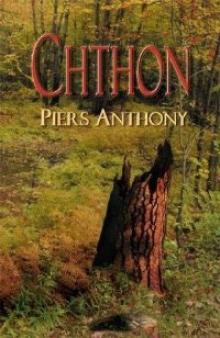 Chthon a-1
Chthon a-1 Amoeba
Amoeba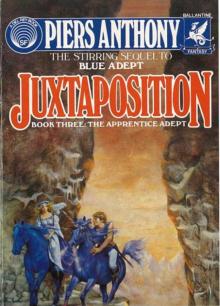 Juxtaposition aa-3
Juxtaposition aa-3 Pira
Pira THE CATERPILLARS QUESTION
THE CATERPILLARS QUESTION What Fears Become: An Anthology from The Horror Zine
What Fears Become: An Anthology from The Horror Zine Bio of a Space Tyrant Vol. 3. Politician
Bio of a Space Tyrant Vol. 3. Politician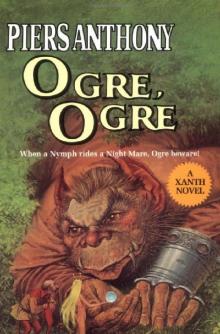 Ogre Ogre x-5
Ogre Ogre x-5 Rings of Ice
Rings of Ice On a Pale Horse ioi-1
On a Pale Horse ioi-1 Luck of the Draw (Xanth)
Luck of the Draw (Xanth) Centaur Aisle x-4
Centaur Aisle x-4 Thousandstar (#4 of the Cluster series)
Thousandstar (#4 of the Cluster series) Gutbucket Quest
Gutbucket Quest Isle of Woman (Geodyssey)
Isle of Woman (Geodyssey) Chaining the Lady c-2
Chaining the Lady c-2 To Be a Woman
To Be a Woman Cluster c-1
Cluster c-1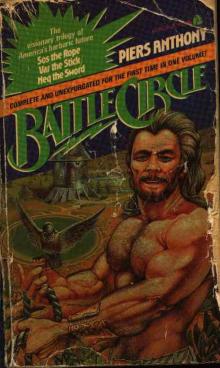 Battle Circle 2 - Var the Stick
Battle Circle 2 - Var the Stick Mercenary (Bio of a Space Tyrant Book 2)
Mercenary (Bio of a Space Tyrant Book 2)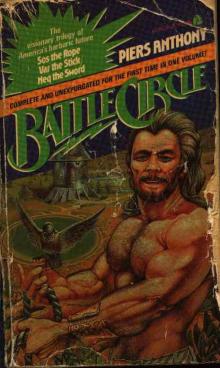 Battle Circle 1 - Sos the Rope
Battle Circle 1 - Sos the Rope Xanth 30 - Stork Naked
Xanth 30 - Stork Naked Secret of Spring
Secret of Spring Xanth 29 - Pet Peeve
Xanth 29 - Pet Peeve Serpents's Silver
Serpents's Silver Statesman by Piers Anthony
Statesman by Piers Anthony Out of Phaze aa-4
Out of Phaze aa-4 Amazon Slaughter & Curse of the Ninja
Amazon Slaughter & Curse of the Ninja